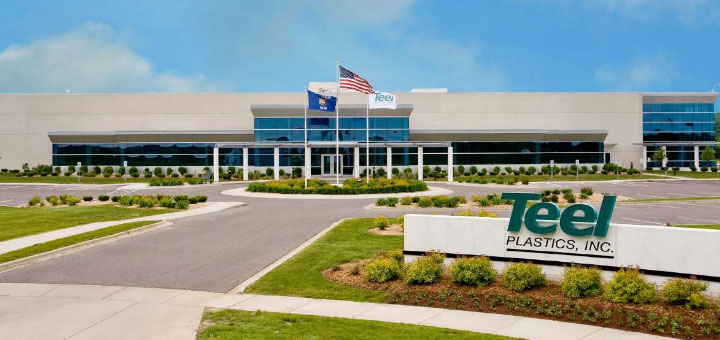Teel Plastics, a privately-held company located in Baraboo, Wisconsin, is a globally recognized specialist in custom extruded plastic products – tubing, cores, and profiles. The company processes over fifty different plastic resins into a variety of products across dozens of different industries and markets, including fiber optics, water filtration, water treatment, cosmetics, automotive, medical and healthcare, pharmaceutical, lawn and garden, and oil and gas, among others.
The company was founded by W.F. “Pete” Teelin, in 1951, as the Insemikit Co., a specialty manufacturer and distributor of agricultural implements and tools for the veterinary and livestock artificial insemination industry. “Pete Teelin had worked for American Breeder Services,” says the current company President of Teel Plastics, Tom Thompson. “At that time, they were using glass insemination tubes for the cattle industry. Obviously, there were problems with using glass. He got the idea of developing that into plastic and started making plastic insemination tubes, which were much more efficient and didn’t have breakage. It took off from there.”
Took off, indeed. In 1958, Insemikit changed its name to Teel Plastics, Inc. and, in addition to its plastic tubing products, became a manufacturer of liquid-proof sampling bags used today in laboratories around the world. In 1999, it was bought by the Jay Smith family, who has owned it ever since. In 2007, the company opened a new, 150,000 square-foot headquarters in Baraboo’s 80-acre Gateway Business Park. Today, Teel has over 250 employees working out of three local factories in the Baraboo area.
Teel is an ISO 9001-certified company, and in 2013, Teel Analytical Laboratories, a division of Teel Plastics, received certification to the ISO 17025 standard, marking the organization as a first-class laboratory in the area of material science and polymer analysis. “We’ve had the lab for the last six years,” says Thompson proudly, “and we’re able to do a great deal of testing on materials coming in for inspection and also on finished products. We have four degreed chemists on staff and so we feel we can really dig down into the technology and properties of the material to create the various, different materials that we produce here, ourselves.”
Thompson says that another one of Teel’s strengths in a very competitive sector is its deep understanding of material properties and their potential uses. “We have a great knowledge of materials,” he says. “What we’re able to do with new customers is take that knowledge and apply it across different markets. So, a material application, say that we used in our fiber optic market, for example, we were able to use in a cosmetic application. You would think that they wouldn’t have anything to do with each other, but those are the type of things – because of our material knowledge and knowing what the customer needs – we’re able to cross-pollinate, so to speak, between different markets and materials.”
“The last area that I think is really important is our capabilities,” Thompson continues. “We do extrusion in varying depths, very tight tolerances, a lot of co-extrusion, up to seven layers of extrusion. We also do some thermo-forming; we do briquetting; we’re getting into injection molding. We also do a lot of compounding and that’s an area that we use to make our own different materials for our customers. So there’s just a wide range of technologies that really sets us apart and helps us problem-solve for our customers.”
Last year, when Business View Magazine spoke to Christian Herrild, Teel Plastics’ Director of Sales and Marketing, we were informed that, this year, the company’s focus would be on training and investing in its people. Thompson reports on those programs’ progress: “We’ve invested a lot of money in our training program,” he begins. “We set up a training matrix for each of our employees. We lay out a roadmap that says, ‘This is what we’re going to help you train on to get to the next level.’ We want to build that roadmap so that people see, when they come in, what they need to do in order to advance within the company – not only in skill, but in pay and knowledge of the process.
“We also bring a lot of trainers in,” Thompson continues. “We’ve got a grant from the State of Wisconsin, this year, and we have a couple of training programs that all employees are going through for gauge training – that’s critical to understanding how to measure parts specifically because some of the tolerances are very tight and you want to make sure that each employee is measuring in the same way. We also have an expert that we contracted with just on the extrusion process – to go through the intense training on tooling, how to process different materials, how to use the equipment, the settings of the extruder, and so forth. We’re at the leading edge of the technology, and we’re making a lot of investments into state-of-the-art and advanced equipment. So when you’re dealing with a lot of those specialized pieces of equipment, you need a trained staff.”
“We also offer apprenticeship programs in our company” Thompson adds. ”A lot of that is geared toward our maintenance and tool-room employees. We’re also trying to set those things up for our employees on the manufacturing floor who run the products, every day. The other thing we emphasize is going back to school. We help our employees with their continuing education in something that may be applicable to our manufacturing process, here. We work closely with the University of Wisconsin in Madison; we have a very close relationship with their polymer science department, getting employees connected there who want to advance their education, whether it’s the engineering side, or just increasing their knowledge of plastics – and also with our local, Baraboo College.”
“And we’re working with the local school districts to bring high school students in here to show them the manufacturing plant,” Thompson concludes. “There are a lot of kids that go through high school who maybe don’t want a four-year degree, or are looking for something else. So, we’re trying to give them a path where they can maybe take a technical college program for a two-year degree and come work for us in a specific area and make a good living. So there’s a wide range of things that we put in place.”
Last year, Herrild also told BVM that this year, the company would be exploring more opportunities in pipe – whether conventional pipe for irrigation, geothermal, or conduit; or interesting and new, higher-end plastics for specific applications. Thompson responds: “We made some investments in some of our extrusion equipment – some larger winders that were needed,” he reports. “And we’ve gotten into more of a plastic conduit and polyethylene products for the fiber optics industry. And then, we’re also making a big push for development in the oil and gas industry for the nylon materials that are going through code approval, right now, to become approved for use in natural gas distribution. That’s an area that we feel is a large market that we’re ready for – as soon as that code approval comes through.”
Lastly, Thompson elaborates upon Herrild’s hope that, this year, the products that the company has in development on the pipe and industrial side, will have grown to the point where either the present facility will warrant expansion, or another one will be added to help support that growth: “We’re going through a process, right now, putting together designs for an expansion of our current facility,” he explains. “We’re getting that design ready, so that when we are ready to expand, we have that on the shelf and we can pull the trigger and get moving on it. We’re waiting on a few large opportunities, like the oil and gas and a few others to make sure that those have taken hold and the volumes are there that warrant a several million-dollar expansion. We want to make sure that that’s the right decision. We’ll probably have to make a decision towards the end of this year, or the spring of next year, depending on how those projects move forward. And if it doesn’t happen, that’s okay. We have a lot of good business opportunities that we’re working on and will continue to grow.”
Indeed, Teel Plastics is clearly doing better than merely “okay.” Recently, the company was awarded the prestigious Wisconsin Manufacturer of the Year Award for 2015. It was also named one of the top 25 World Class Plastic Processors by Plastics Technology Magazine, this past January. “We’re very proud of that,” Thompson states, unequivocally.
Finally, after reporting on last year’s company goals, Thompson adds a new one of his own for this coming year: “My number-one focus is targeting acquisitions for Teel,” he reveals. “Plastic extrusion companies – seeing if we can grow the business there or maybe obtain an upgrade in the technology or markets that another company has. We, as a company, have not had a history of that, but our owner, Jay Smith, has a great deal of history doing acquisitions. So, it’s an area that we’re very excited about. We have a plan, now, moving forward, with a broker that’s going to help us with that venture and see where that leads us.”
Meanwhile, Teel Plastics will continue to rely on its ability to combine leading-edge scientific, technical, and material knowledge in service to its many, current clients – some of whom have been with the company for decades. “Once we get somebody as a customer, they tend to stay,” boasts Thompson in a jovial way. But when asked exactly why those long-term customers do remain, Teel Plastics’ president turns serious and replies succinctly: “Teel, as a privately-held company moves very quickly. We have a great technology, in-house, and our people are here to solve problems for our customers. We’re a technically-driven company. We work in a lot of regulated markets, so we dig deep into those markets that, a lot of times, other companies shy away from. We take on challenges that other companies don’t. And we’ve been successful in taking on those challenges. And a lot of companies come back to us for different challenges along the way.”
Read our first feature profiling Teel Plastics, published in 2015
______________________________________
AT A GLANCE
WHO: Teel Plastics
WHAT: A manufacturer of custom extruded plastic tubing and plastic profiles
WHERE: :Baraboo, Wisconsin
WEBSITE: www.teel.com
PREFERRED VENDORS
Premier Polymers LLC – Premier Polymers is a leading plastics marketing and distribution company with an extensive product line and warehouses and sales offices located across the U.S. and Canada. It offers a full line of polyolefin and styrenics resins for use in a wide variety of applications. From polyethylene film processors to polypropylene injection molders and polystyrene sheet extruders, Premier Polymers brings value to all of its customers through its broad slate of plastics products and an unmatched level of service and support. The company, which is based in Houston, Texas, is a wholly-owned subsidiary of Vinmar International, a global leader in chemicals and plastics marketing, distribution, and project development. – www.premierpolymers.com


